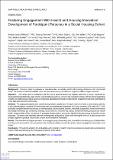Fostering engagement with health and housing innovation : development of participant personas in a social housing cohort
Abstract
Background : Personas, based on customer or population data, are widely used to inform design decisions in the Commercial Sector. The variety of methods available mean that personas can be produced from various sizes and types of project. Objective : To experiment with the use of personas that bring together survey, household air measurements and electricity-usage sensor, and interview data within a research and innovation project, with the aim of supporting eHealth and eWellbeing product, process and service development through broadening the engagement with and understanding of the data about the local community. Methods : The project participants were social housing residents (adults only) living in central Cornwall, a rural unitary authority in the United Kingdom. A total of 329 households were recruited between September 2017 and November 2018, with 235 (71.4%) providing complete baseline survey data on demographics, socioeconomic position, household composition, home environment, technology ownership, pet ownership, smoking, social cohesion, volunteering, caring, mental wellbeing, physical and mental health-related quality of life and activity. K-prototype cluster analysis was used to identify eight clusters among the baseline survey responses. The sensor and interview data were subsequently analysed by cluster and the insights from all three of the data sources brough together to produce the personas, known as the Smartline Archetypes. Results : The Smartline Archetypes proved to be an engaging way of presenting data, accessible to a broader group of stakeholders than those who accessed the raw anonymised data, thereby providing a vehicle for greater research engagement, innovation and impact. Conclusions : Through the adoption of a tool widely used in practice, research projects could generate greater policy and practical impact, while also becoming more transparent and open to the public.
Citation
Williams , A J , Menneer , T , Sidana , M , Walker , T , Maguire , K , Mueller , M , Paterson , C , Leyshon , M , Leyshon , C , Seymour , E , Howard , Z , Bland , E , Morrissey , K & Taylor , T 2021 , ' Fostering engagement with health and housing innovation : development of participant personas in a social housing cohort ' , JMIR Public Health and Surveillance , vol. 7 , no. 2 , e25037 . https://doi.org/10.2196/25037
Publication
JMIR Public Health and Surveillance
Status
Peer reviewed
ISSN
2369-2960Type
Journal article
Rights
Copyright © Andrew James Williams,Tamaryn Menneer, Mansi Sidana, Tim Walker, Kath Maguire, Markus Mueller, Cheryl Paterson, Michael Leyshon, Catherine Leyshon, Emma Seymour, Zoë Howard, Emma Bland, Karyn Morrissey, Timothy J Taylor. Originally published in JMIR Public Health and Surveillance (http://publichealth.jmir.org), 16.02.2021. This is an open-access article distributed under the terms of the Creative Commons Attribution License (https://creativecommons.org/licenses/by/4.0/), which permits unrestricted use, distribution, and reproduction in any medium, provided the original work, first published in JMIR Public Health and Surveillance, is properly cited. The complete bibliographic information, a link to the original publication on http://publichealth.jmir.org, as well as this copyright and license information must be included.
Description
Funding: European Regional Development Fund (ERDF) and the South West Academic Health Sciences Network.Collections
Items in the St Andrews Research Repository are protected by copyright, with all rights reserved, unless otherwise indicated.
Related items
Showing items related by title, author, creator and subject.
-
Strength in a weakened state : interpreting Hizb’allah’s experiences as a social movement and governing coalition in Lebanon 1985-2013
Bernhoff, Arthur (University of St Andrews, 2015-06-23) - ThesisThis study investigates Hizb’allah’s successful but competing dual development as an extra-institutional Shi’a social movement and an institutional political party. Hizb’allah has traditionally been studied from the ... -
Radical social innovations and the spatialities of grassroots activism : navigating pathways for tackling inequality and reinventing the commons
Apostolopoulou, Elia; Bormpoudakis, Dimitrios; Chatzipavlidis, Alexandros; Cortés Vázquez, Juan José; Florea, Ioana; Gearey, Mary; Levy, Julyan; Loginova, Julia; Ordner, James; Partridge, Tristan; Pizarro Choy, Alejandra; Rhoades, Hannibal; Symons, Kate; Veríssimo, Céline; Wahby, Noura (2022-04-05) - Journal articleIn this article, by drawing on empirical evidence from twelve case studies from nine countries from across the Global South and North, we ask how radical grassroots social innovations that are part of social movements and ... -
Wellbeing and social network characteristics in rural communities : findings from a cohort in social housing in Cornwall, United Kingdom
Long, Emily; Stevens, Sebastian; Topciu, Raluca; Williams, Andrew James; Taylor, Timothy; Morrissey, Karyn (2022-05-19) - Journal articleBackground: The mental wellbeing of those living in resource poor and rural localities is a public health priority. Despite evidence of a link between social networks and mental wellbeing, little is known about this ...

